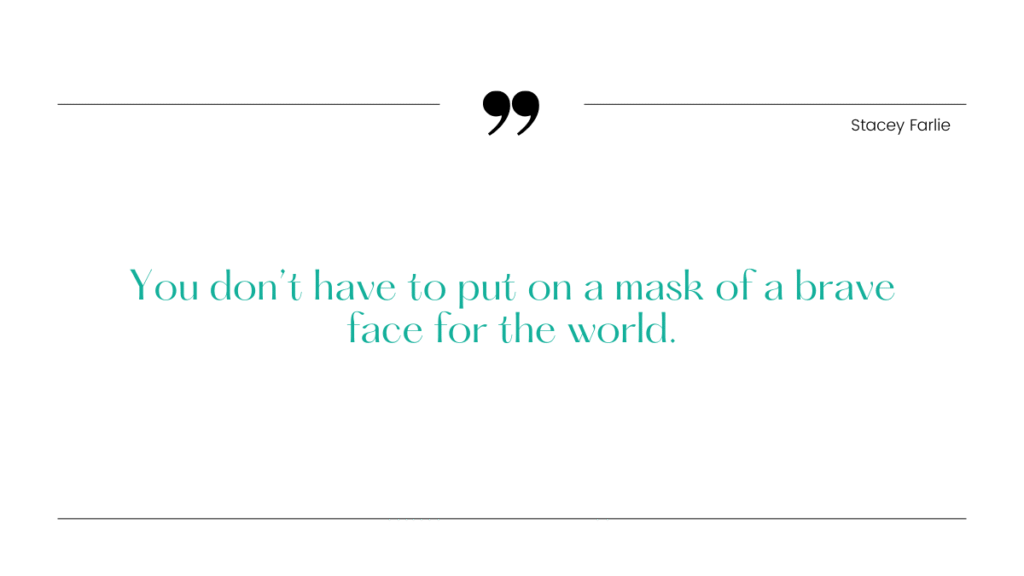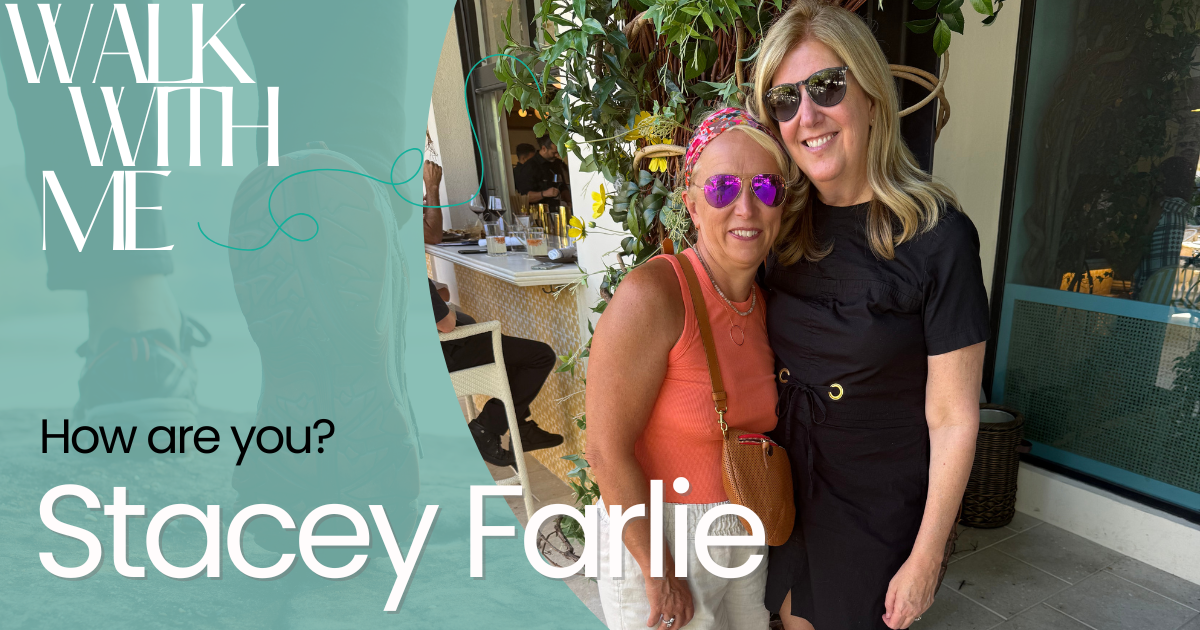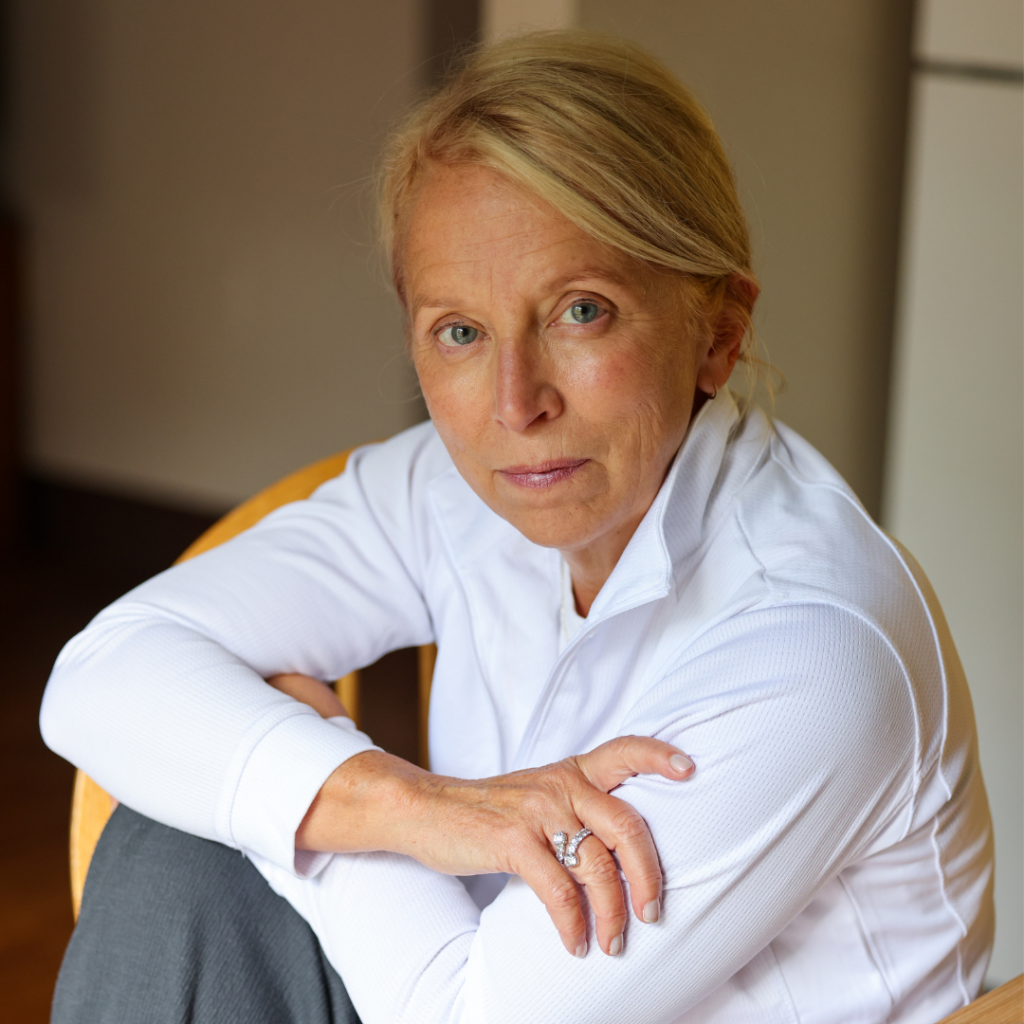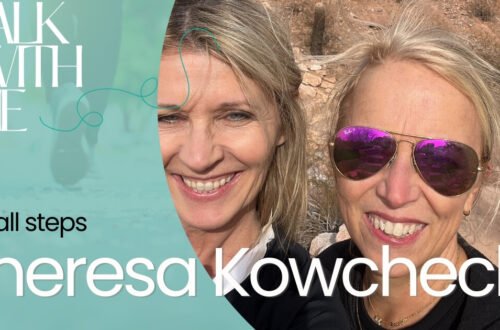Five years later, we still don’t understand the physical and emotional impact of the pandemic. I have barely scratched the surface of the educational impact. With every conversation on the topic, I learn something new. For example, when I first heard the term “Long COVID,” I assumed it meant feeling run down with lingering symptoms. That doesn’t even begin to explain it.
Stacey Farlie has explained to me for much of the first year, she could barely get out of bed. She was a prisoner in her house except for quick trips to the grocery store. Today she is better. What does better mean? She deals with elevated temperature and flu-like symptoms from the routine task of taking medicine or supplements and massive post-exertional malaise (PEM).
She went from spinning 4-5 times a week to barely being able to walk. Everything exacerbates this… food, heat, exertion, mental anguish…it’s a constant yet unexpected roller coaster in a life of unforeseen limitations that are strange and complicated. Each relapse brings with it unremitting depression, crying, fever, sore throats and breathing issues, congestion, hoarseness, internal vibrations. Not to mention an inability to stand up for too long.
Stacey’s three-year journey through this invisible illness reveals not only the profound physical and emotional toll of Long COVID, but also the gaps in our medical system, the loneliness of suffering from a condition that others can’t see or understand, and the urgent need for all of us to expand our compassion for those fighting battles we cannot imagine. This is her story, told with her permission, because sometimes the most powerful medicine is simply being heard.
Stacey: It’s just a very hard thing to describe to people. They just think you’re tired.
It’s not like I need a nap. It’s like somebody has unplugged all my cells.
Check yourself. What is your initial impression when you hear the term, Long COVID? What presumptions bubble to the surface? I’ll admit I had no idea it had dropped my college roommate into a world where her own body would become unrecognizable to her, where the simple act of taking medicine could leave her bedridden, all within a medical system – traditional and alternative – that struggles to understand what is happening.
What I’ve learned, through Stacey’s recounting of her countless doctor visits, mysterious fevers, and hours of research deep-dives is that this isn’t a disease, it’s a post-viral syndrome, and it is devastating. In fact, research completed in the United Kingdom revealed something Stacey already felt in her bones: people with Long COVID may actually suffer more than those battling certain types of cancer.
Stacey: They did a study of people, and they said that people with Long COVID actually suffer more than people with cancer, because when you have cancer, now this is probably not if you’re dying of cancer, but just having cancer – there’s a protocol, there’s support. You have days where you can feel really good. You know it’s probably going to be over, hopefully, for the most part. It’s a really bad period that you’re going through. They found that the people with Long COVID were actually suffering more because there isn’t any of that.
Not because cancer isn’t devastating—it absolutely is—but because cancer patients have something Stacey doesn’t: a clear diagnosis, established treatment protocols, a healthcare system and public opinion that takes their suffering seriously. This study published in BMJ Open, involving over 3,750 Long COVID patients across England, found that the impact on one’s daily life was worse than stroke survivors and comparable to people living with Parkinson’s disease.
“Long COVID is an invisible condition,” explains Professor William Henley from the University of Exeter, one of the study’s authors. “Many people are left trying to manage significant changes to how they can function. Shockingly, our research has revealed that Long COVID can leave people with worse fatigue and quality of life than some cancers, yet the support and understanding is not at the same level.”
The invisibility he mentions Stacey has described as isolation. There are no established clear treatment pathways, support groups, nor a shared understanding of Long COVID. You often look fine from the outside, but you’re trapped in a body that is betraying you while the world expects you to function normally.
Stacey: Okay, so here we start crying.
Liz: I’m sorry.
Stacey: It’s just really hard. I mean, I think the hardest thing about Long COVID is how lonely it is.
In the beginning, like with any acute sickness, your friends rally around you. But once you’ve been sick for a while, especially with COVID being so politically loaded and people just wanting nothing to do with it. If I had said I had almost anything else, I think I would have gotten a completely different reaction. But It’s very isolating.
Stacey has had to become her own case manager, researcher, and advocate out of necessity. She has had to stand up for herself in the face of skepticism and dismissal from friends and physicians alike.
Stacey: And I have what you would call a busy brain. I’m always thinking. And so imagine when I first had this, I wanted to figure out what to do. I’m a problem solver, and I wanted to… I felt like the answer had to be out there somewhere if I just looked hard enough. I don’t know. I do still think there is an answer, and I do think there are ways to get better. And sometimes it’s just time. It’s been three years now. I am much better than I was that first year that I’m describing to you.
Liz: Better isn’t the answer. I don’t want you to feel better. I want you to feel good.
So I was wrong. Long COVID isn’t just about being tired. Stacey can’t push through or think more positively to navigate her way through this disease…and it isn’t a disease. This is a complex, multi-system illness that has fundamentally altered Stacey’s body and her life. It’s about waking up every day not knowing what might cause her next downfall – other than the very medicine prescribed to help.
Liz: You’ve got to be tired of silver bullets that don’t work out.
Stacey: Well, the bigger thing is I can’t take anything.
And by that she means medicine or supplements without getting a fever and mini relapse.
Stacey: So until someone figures out how to turn that mechanism off… It took me a year to connect the dots and see it wasn’t until I got off all the medicine that my fever started to go down a little and then eventually go away. Now, when I take anything, I immediately get a fever, and I feel like I have the flu. Anything anything, like aspirin, which should quell the fever, but it doesn’t.
Covid triggered a systematic collapse that she hasn’t recovered from over three years later. Again, check yourself. Are you thinking about an underlying condition and coming to the conclusion – ok then that couldn’t happen to me. At one point a Long COVID specialist wanted her to take a strong immunosuppressant.
Stacey: I was so sick. I kept protesting taking the medicine because I’m like, I don’t react well. This is before I knew why, but I was like, I don’t react well to this. This is a really strong medicine. It’s what they give you when you’ve had a transplant to keep you from rejecting the organ, it has a black box warning, can cause cancer.
I’m like, Are you kidding me? I don’t do well with little things. And he was like, Well, what are you going to do? Just sit here crying? You need to take steps. You need to do something. He’s said, I know better than you that this is what you need to do.
And because I was in such a vulnerable place, I was like, Okay, I’ll try. So I went home. Really, I was trying it just to prove him wrong. And I immediately took it… within an hour I had a 104 fever. I was on it for a few days, and then I just took myself off of it. That launched me into three months in bed, basically. And it wasn’t really until I got off of all the medication that I slowly, slowly, slowly started to be able to get out of bed.
I didn’t know what to do because at that point, I was like, I’m done with Western medicine. All they have
Liz: …is what’s on the flowchart.
Stacey: in their bag of tricks is medication.
COVID is an unknown that landed us all in a massive science experiment. While researchers work through hypotheses and debate treatment protocols, real people continue to suffer—and if it’s not happening in our own homes, we remain blissfully unaware of their reality. Stacey has given me permission to tell this story for awareness, knowing that this account might not change her outcome, but it could possibly shift one person’s understanding or ease the isolation for someone else walking this difficult path.
A new study has developed a blood test to diagnose Long Covid.
Stacey: And I don’t think they know enough about it yet. So, that study, I thought, was very interesting because it’s the first step. Then they’re going to develop a blood test eventually. I mean, again, kind of silly, because I know I have Long COVID, but at the same time, they’re now going to start working on antivirals…
Liz: And the medical world needs the blood test that says, yes, here’s the diagnosis to do the next thing, so at least you’re another step out of the flowchart.
Stacey: Western medicine, the way they operate is you have to do a study, then you have to get it passed through all this bureaucracy, and then eventually you can give that medication for that illness.
Medicine that Stacey cannot take, but she tried time and again as instructed by doctors and naturopaths alike.
Stacey: I did because I’m a good girl, and I listen …most of the time. But I’m also a rebel. If I don’t see it going well, I’m out.
Liz: This is trauma for you. This is not just medical because in trauma, something hasn’t happened for two years, but when it happens, it feels like it happened yesterday. That has to be what these reactions feel like to you.
Stacey: It is. I take it back with the loneliness is not the worst part. The worst part is the setbacks. I can be going along and I’m pretty good and I’m functional for a month, and then I try something…. And to be back in that place is so difficult.
Liz: Yeah. And you got to beat yourself up. I can’t even imagine.
Stacey: Yeah. And I just feel like it’s never going to get better.
I think that one of my biggest epiphanies of this whole experience has been about masking. And I think we all do this to some extent. I’m a bit of a perfectionist, and I always have that mask on .. everything’s great, and I’m doing this, and I’m achieving that. And it’s carried on into the sickness, where I’m doing what other people want. I’m pretending like I’m fine because I can’t deal with their reaction. It’s just not worth it.
Liz: And that comes from the good girl syndrome.
Stacey: Yes, absolutely.
There’s another layer to this struggle. As someone raised to be a “good girl”—to be accommodating, to not make a fuss, to put others’ needs before her own—advocating for herself in a medical system that already struggles to take women’s pain seriously has been its own form of torture if you ask me. Given that women make up 71% of Long COVID clinic patients, I am certain there are many females trying to break free from the “good girl” trap—learning that your suffering matters, you are not a burden, you deserve care, saying “no” isn’t selfish. You don’t have to put on a mask of a brave face for the world. Ironic to be talking about masking – putting on a brave face – in relation to the pandemic that required masking and gave it a completely different meaning.

Liz: The other thing this plays into is that other thing we have being perfectionist, overachiever, overthinker, good girls, is ‘I’m not doing enough.’ And I’m sure you feel that way. And as your friend, I feel that way. I’m not doing enough.
Stacey: That’s very hard because Craig (Stacey’s husband) constantly wants me to do nothing because it does appear like I’m better doing nothing, but then I’m also not healing. It’s just a band-aid. I think. But that’s how I feel. He can’t see that or feel that. But I have this constant need to try things.
I get that. Our social media feeds are saturated with products that promise to improve our lives – be healthier, lose weight, have more strength, stamina, serenity… These endless advertisements prey on our insecurities and offer a stream of “solutions” that suggest our current selves are somehow inadequate. Of course, we all fall prey to one thing or another.
Liz: Gosh, my mom, I asked her one day, “Mom, you’ve been in medicine. How long? What is the thing? I want one thing I should do every day that is going to make me better because I can’t keep following the long list that just keeps getting longer of what I’m supposed to do.” She laughed at me and she said, eat an apple and go for a walk.
We were in the pool at her apartment complex, and there was another man who happened to be standing nearby. And I saw him months later at a yoga class, and he looked at me and said, ‘Still eating my apple every day.” And I looked at him and I said, ‘Are you kidding?’ And he says, ‘I heard your mom. I walk every day and I eat an apple every day.’ I said, ‘How are you feeling? He goes, I don’t know how I’m feeling, but I feel like if your mom told me to do it, I’m doing it.’
I don’t know. I do think we can run ourselves ragged as a full population. So I can’t even imagine how it would be for Stacey.
There is no magic bullet – and of course I wasn’t suggesting an apple could cure Stacey’s ills. I told her as much, but I couldn’t help but chuckle when she texted me later in the day, “…I just had an apple.” It’s not about the apple. It’s my mom. As a physician, she listened… to a fault. You knew she cared. She also had an uncanny sense to hear symptoms and make recommendations that worked. I think of her every time I cut an apple. Before I take my first bite, I feel better. I doubt an apple will have the same curative effect for Stacey, but I do wish mom were here to talk to Stacey …to offer her rare brand of support.
Liz: What would positive support have looked like? Can you identify that?
Stacey: Yeah, it’s really not hard. It’s just checking in. It’s checking in and being curious, wanting to find out, well, what are you feeling? Just being heard is support. And just saying, oh, my God, that must be really hard.
Liz: When somebody says, How are you? They want you to say better. They’re really not looking for any other answer. And I don’t know how to change the question because now in my life, when I say, How are you? I want the truth. ‘I’m as shitty today as I was yesterday.’ That’s a good answer. But I don’t know how to change the question because ‘how are you’ in this society is as throw away as the wave I just offered to a woman on this walk. It was just a courtesy.
Stacey: You asked what I need from other people. I am somebody who likes to work through my problems by talking. That’s how I think. The more I talk through it, I have epiphanies when I talk.
Liz: That’s what this whole walking project is.
Stacey: Exactly. So what I’ve learned by this is that other people are the opposite. They don’t want to talk about problems, that’s not what they want to do. And so that’s really been the hardest thing about Long COVID is being shut down. I do want to talk about it. I do want people to ask, ‘Well, explain to me, What are you doing? What do you think? And why? Do you have any ideas why you can’t take any medicine?’ It helps me to work through it. Sometimes I put pieces together that I would have never had before if I hadn’t talked through it.
Not everyone wants to talk through it. Not everyone processes that way. We also have to leave room for our differences.
Stacey: I’ve realized friends serve different purposes at different times.
Liz: Nobody can be everything for us.
Stacey: Absolutely.
Liz: And it’s okay.
Stacey: And you can come back to them at a different point when you need them for other things, or you can be there for them.
Show up. Text. Call. Ask. So many of these walks have offered these same reminders. Why do we forget life is precious? We do not know what lies around the corner.
Stacey: We take each other for granted.
Liz : Oh, my God. I’m taking the fact that I’m walking for granted. I can’t tell you how many times in this call I’ve thought, I got to stop bitching. I feel good for the most part. I can walk.
Stacey sat for our “walk” – a more than acceptable exemption in this case. I wish her illness wasn’t so unknown. I wish she could count on more strength. For how much I hate medical flowcharts, I wish there were protocols to follow that promised some relief.
Liz: We don’t know what to do with Long COVID, and we want it to just fit neatly into a box, and it doesn’t. And that’s what it is for the friend who doesn’t have it. But for you, you literally have no choice but to respond to what your body is forcing you to do.
Stacey: Yes. And it’s just a very hard thing to describe to people. They just think you’re tired.
We need a new word. The actual medical term for long COVID/ME-CFS fatigue is post-exertional malaise. That’s probably not it, but “tired” is too commonplace. When someone says “I’m tired,” people immediately think of their own experience of tiredness and respond with advice like “get more sleep” or “have some coffee.” But Long COVID fatigue is more like having the flu while hungover after running a marathon – it’s a completely different physiological state… but through the haze of that, Stacey can still find positives.
Stacey: It’s the essay writer in me…you have to have a conflict, and then come out the other side…
And she has the fortitude to see the positive growth she has experienced.
Stacey: I’ve become a lot more emotionally self-reliant, which is hard for me, because I talked to you about how I like to talk through my issues, but I’ve had to reach deep and keep reminding myself, ‘It’ll be a little bit better tomorrow, I’m just having a bad moment,’ …kind of talk myself through it.
She is also learning patience and making herself a priority when much of our lives as wives, mothers has been about everyone else.
Stacey: that’s another thing I’ve had a lot of trouble with, is…
Liz: what’s that?
Stacey: Putting limits.
Liz: I don’t know, I think… I think you could teach me a ton about how to use the word no. I mean, my mom used to say all the time, it’s a full sentence.
Stacey: Yes, and I still have my problems with that.
Liz: I have never once felt let down because you took care of yourself, even when you weren’t coming to reunions. I was disappointed I wouldn’t get to see you, but there was a part of me that was so effin’ proud of you for putting yourself first, because that’s just not typical, especially for women our age.
What if we rested when we need to? What if we prioritized our health and our future selves over a scheduled trip, event or meeting? What if we knew ourselves well enough to say no much more often than we do. And while we are talking about what if… what if a researcher heard this story and asked, how can I help? What can I learn? Stacey Farlie is not a statistic. She is one of my dearest friends and simply listening to her is not enough, but there is little else I can do… well… I could write her story down and share it.
Stacey allowed me to share her story not because it will cure her illness or change the medical system, but because she knows that many others suffer invisibly and they do not need to feel isolated. The act of truly seeing someone, of asking with genuine curiosity about their experience are profound gifts we could all offer much more freely.





